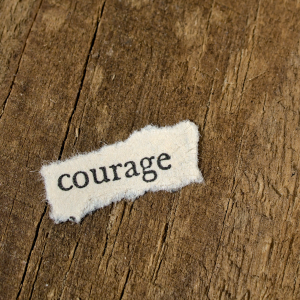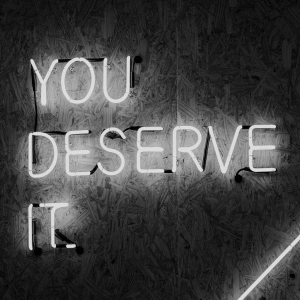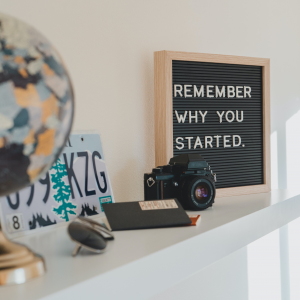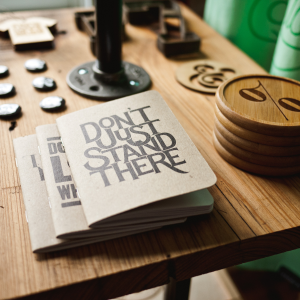In this episode, I’m digging into “Imposter Syndrome” and what to do when you feel like a fraud. Not familiar? If you’ve ever felt like a fraud or an imposter at something you’re doing, you’ve probably experienced Imposter Syndrome. Have a listen to this episode to learn more!
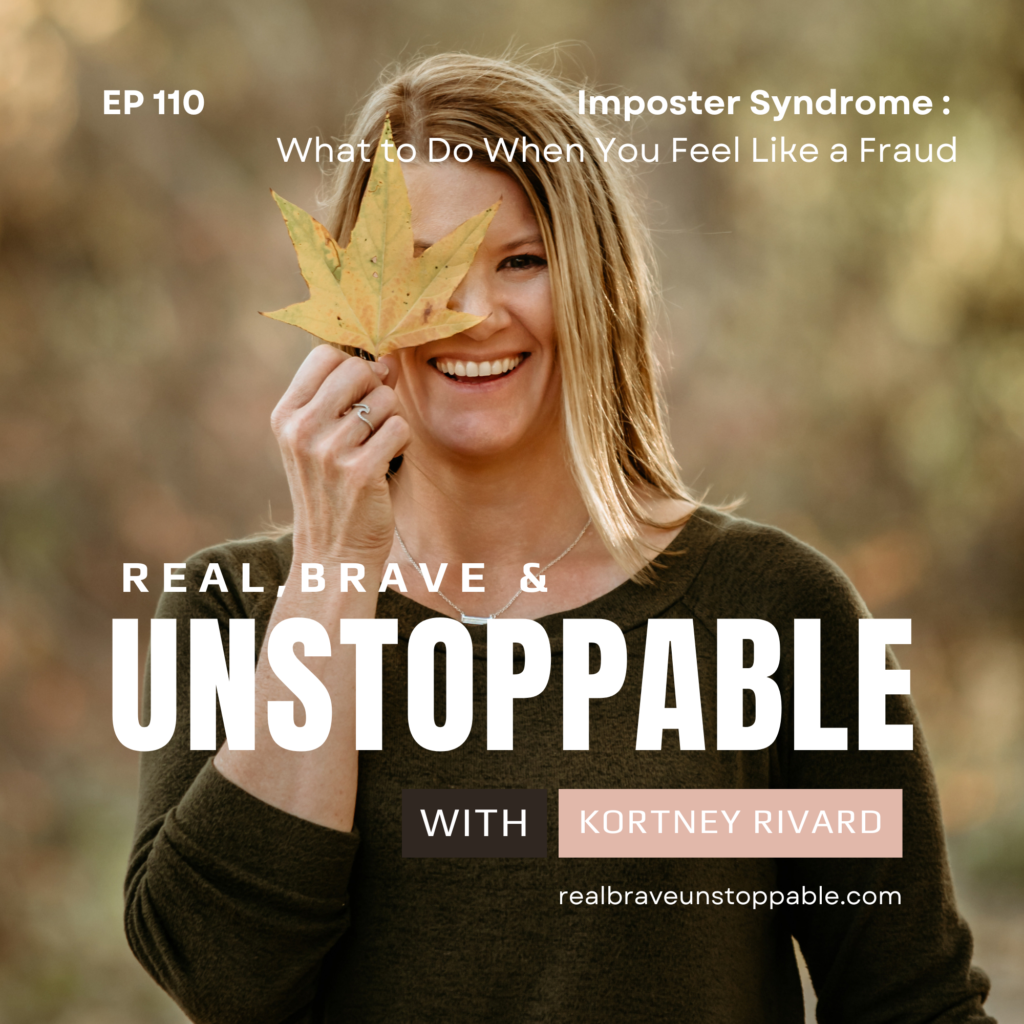



Show Notes:
Welcome to Episode #110 of Real, Brave, & Unstoppable!
This week, I’m diving into the nitty gritty of Imposter Syndrome and what to do when you feel like a fraud.
In this episode, you’ll learn:
- what Imposter Syndrome is and how to recognize it
- some of the common negative beliefs that keep you stuck in Imposter Syndrome
- the impact Imposter Syndrome can have on your life (and your happiness)
- how to “cure” Imposter Syndrome
Have a listen and don’t forget to leave a rating and review!
Resources
How to Create the Life You Want FREE workbook
Click HERE
Schedule a Discovery Call …
Podcast host and life coach, Kortney Rivard, has helped dozens of people manage their imposter syndrome and perfectionism so they can live happier, more fulfilling lives. Want help kicking Imposter Syndrome to the curb once and for all?
Support the show (https://www.buymeacoffee.com/kortneyrivard)
Other episodes:
- Ep 122: How to Take the High Road When People Say Mean Things About You
- Ep 121: 5 Ways to Make the Mirror Your Friend
- Ep 120: Getting Back on the Goals Bandwagon – Setting Better Goals
- Ep 119: Slow Down! How to Embrace Getting Still and Waiting Patiently
- How to Fix Your All-or-Nothing Thinking
The Real, Brave, & Unstoppable full episode catalog
Transcript:
Episode 110: Imposter Syndrome: What to Do When You Feel Like a Fraud
Hello, everyone and welcome back to Real, Brave and Unstoppable. It’s been a minute, huh? If you’re a, if you’ve been waiting for an episode, I thank you for your patience. I took a much needed sorta break in December and January to kind of regroup and think about what kinds of topics I wanted to bring you all the season. So here we are for a new season of real, brave, and unstoppable season four. First of all, just a little bit of housekeeping before we go anywhere else. If you’re enjoying this podcast, can you do me a favor and just please give me a rating and a review. this does double duty. It helps me know that if what I’m giving, you know, I’m putting out is resonating so I can do more of it or change course. And it also helps other people find the show, which is really important to me. And as always, if there’s a topic that you’d like to see me cover, just send it over. I’m always looking for ideas so you can visit my website at the podcast website. Real brave, unstoppable.com navigate to the contact page and send me a note. Anyway today I’m covering a topic that’s one of the things I hear about over and over and over again from clients, friends, and just about anyone I talked to about personal growth or self-confidence, self-concept. And I find it, you know, mostly women when I talk about this, but it definitely affects men as well. Are you ready for it? Imposter syndrome. So if you know what imposter syndrome is (feel like a fraud), then you’re likely going, oh God, thank God. She’s doing an episode about this. And if you don’t know what it is, you may or may not relate to it. So I’ll just kind of tell you a little bit about what it is. It’s really, when we feel like we’re a fake, you know, we doubt our competence. One of the things that is common is to sort of think, well, when are they going to find out that I don’t really belong here? It’s really feeling like I mentioned fake at something. And even if you’ve been successful in a certain area, it’s like, you’re always doubting your ability. A lot of perfectionists run into this, I will say I’ve been there myself. When we’re in imposter syndrome, (feeling like a fraud) one of the things that’s common in that is that we find ways to discount our achievements, even though people on the outside world look at us and we’re like, what? You doubt yourself? Like, you’re amazing. So that’s a really big part of imposter syndrome (what to do when you feel like a fraud) is you constantly experienced self doubt. Like I had mentioned before, even in areas where you’re typically excelling or other people see you as excelling. I read a couple of articles about like how many people this affects and the number that I read like everywhere it was at least 70% of people have experienced some form of imposter syndrome (feeling like a fraud). And, even Maya Angelou, the great poet. She’s published many books. I don’t even know how many, but she talked about imposter syndrome (what do do when you feel like a fraud) like she always wondered, when she published a book, is this going to be the book where they’re like, oh, she’s not really good at what she does. So even, you know, Albert Einstein suffered imposter syndrome. So it’s very common. My own personal story… When I got to a point in college where I was starting to look for jobs, or even when I got my first job in engineering out of college. I had a lot of this, like, I’ll share my story with, with it and you can see if you relate to any of it. But growing up, I was always a straight- a student and I was really driven and pretty much everything I did I excelled at. And as a perfectionist, I had really high standards for myself. But when I went to college, the competition, you know, it was tougher more people and in a field like engineering, of course it attracts a lot of people who are really intelligent and capable. And, in college I was no longer at the top of my class. And that was kind of a, like a, you know, mental rule I had kind of had to be the best at everything. So when I got into college, like that was failure to me. Like I’m not at the top of my class anymore. I’m stupid. You know, I don’t belong in this major. I was doing just fine, but anyway, I digress. So, you know, fast forward to when I was graduating or getting ready to graduate. I had some great job offers from great companies. And, you know, I ended up working for Boeing, but obviously there was something that these companies saw in me just based on the way I interviewed and, and my resume and all the, in my grades and all the things. So, you know, of course it’s not like. I, you know, I made all this stuff in my stuff up in my head. But when I started working at Boeing, I noticed that, when I look back, I can see that I constantly compared myself to other people who were not only just new hires, but also, you know, the other people I worked with. And I was really always evaluating like every piece of everyone else’s performance, like how smart they seemed, how they interacted with our more senior colleagues and managers, and other things too. But no matter what, I always viewed my abilities as less in comparison to theirs. And I felt that unless I was at the best or at the top, what I was bringing to the table was really no good. I had thoughts about not belonging there, or this is a common thing I hear people say is like, when are they going to find out that they made a mistake in hiring me? That was a question that often, well, truthfully, most of the time, like looped in my brain. And it’s kind of funny because if you asked anyone on the outside and I have told this story many times and people comment, like really? You felt that way? Like they just saw a whole different thing from the outside. Right? But, you know, when I look back at it or other people look at it, it’s like, why on earth with the achievements that I had reached throughout my life? What I have thought that I didn’t belong? My perception was others were smarter and there was some kind of standard I created in my head that they were meeting and I wasn’t. I had a really inflexible perspective around this. My brain had a lot of stories going on that I just couldn’t see another perspective too. And in reality, everyone has strengths and weaknesses. And as a new hire, you’re never supposed to know how to do your job right out of the gate. Right? Yet I expected myself to. Pretty crazy standard. But, you know, there’s learning curve to overcome and experience to be gained. My perfectionist mind had such high standards to meet and not really a lot of room to be flexible with those standards. I’m going to do an episode on perfectionism coming up soon too. So if you’re looking for more. About perfectionism and how to manage that in your life. Stay tuned for that. Another story I have is a client of mine was once an internationally known expert in her field. And she left her specific specialty in that field when she moved across the country to live near her children. She took a job that was in the same field, but a different specialty. So she had enough background in this industry that she was able to transition to the new specialty, but she had less experience to draw on and rather had to draw on a lot on what she learned in school and just sort of transference of, you know, this other specialty. And she was working with much younger people who were less removed from their studies. Also people who had been in that specialty for a long time. So their overall knowledge was fresher and more ingrained. They had more experience in that specific specialty. Now she was perfectly capable of doing this job, but imposter syndrome (feel like a fraud) was showing up really big for her. She was filled with a lot of self doubt and felt like she wasn’t good enough to be in that position. And just constantly overanalyzed herself, both in interactions with clients and in her own performance. And the message that her brain kept giving her was that she was going to get “found out” and fired. In reality, she was plenty good at her job and everybody needs to learn. And even the people who, as quote unquote, imposter… (feel like a fraud) you know, even the people you see as being better than you, they have things to learn too. Another client of mine is a young financial analyst and she has a really hard time speaking up in meetings. She’s afraid that what she has to contribute will be useless and she’ll look like stupid or she’ll be wrong. And so she constantly doubts herself at work because she doesn’t feel like she measures up to everyone else. Everyone is better. Everyone is smarter. Things like that. And one more example. I had another client who is an entrepreneur and she really struggled with charging what she was worth for what she did. And her rationale was that she couldn’t charge very much because she had so much more to learn. And she couldn’t charge that until she learned it. You know she felt like she wasn’t an expert at what she did. So in her mind, she needed to know everything, be an expert, before she could charge for her services or she’d feel like an imposter. Well, she feels like an imposter either way. So. There you go. I did a lot of work on the whole imposter syndrome (feel like a fraud) thing and really what it came down to is creating a more flexible set of rules or, you know, just helping myself become more mentally flexible with things like that. I’ve also helped a lot of people overcome it. So today I want to talk about where’s the silly thing come from and how you can overcome it. And I do also want to clarify too, that you know, it’s not like once we do some work to shift this, it’s not like it never shows up again. It’s just that we have the tools to recognize it and do what we need to do to sort of, you know, calm it down. We talk to our brain and say, Hey, you know what? Thanks for trying to make me feel like an imposter, but I’m good. So we’ll talk and we’ll talk more about strategies for this too. But there are a few different ways that imposter syndrome (feel like a fraud) shows up. And I’ve given you a few examples, but I just wanted to go through, I found an article on the site very well mind that breaks it down really nicely. So I’m going to share the categories that they broke it into because I think it’s really helpful. First there’s the perfectionist imposter. And this type… And to be clear also, you may have more than one type, but this type. Is really a matter of believing that unless you’re totally perfect. Like you could have done it better. Your perfectionistic traits makes you believe that you’re not as good as the other people. So in my story about, you know, when I was an engineer, a lot of it was that. In my mind, I wasn’t doing everything perfect. So it’s very black and white. If it’s not perfect, then you suck. So that’s the first kind. And then there’s the expert. I met that showed up in one of the examples I gave you two and the expert feels like if they don’t have everything mastered, or they don’t know everything about a particular subject or topic that they’re not good enough. They don’t belong in the position that they are. Because there’s more to learn, they don’t feel as if they’ve reached that rank of expert and to them, like, they need to be an expert to be good at, you know what they’re doing. The next one is. The natural genius. And this one is kind of like, if you don’t think that you’re naturally smart. That you think that you’re a fraud. Like everyone else just has this naturally smart. Everyone else is naturally smart. It comes easy to them. I have to work for it, so that means that I don’t belong here. The next one– in the article they call it the soloist. I like this name, but here you can feel like an imposter if you have to ask for help to reach a certain level or a goal or something like that. And since you couldn’t get there on your own, you question your competence or, you know, your capability. And the reality, like we all need help. Right? It’s that’s how we grow and how we learn. The next one is the super person. And this one is, I don’t see this one show up quite as much, but I have seen it, but it’s where you believe that you’ve got to be the hardest worker of everyone or reach the highest levels of achievement. I guess I do see this one often too with reaching the highest levels of achievement. But if you aren’t the hardest worker or if you’re not reaching the highest levels, you’re a fraud. So when we fall into imposter syndrome, (what to do when you feel like a fraud) we do things like beat up on our performance or, you know, our ability. Sometimes we can even attribute success to external factors. Like, oh, well I only achieved this because of this. Like I only achieved this because so-and-so helped me. And if they wouldn’t have helped me, I never would have done it. So it doesn’t count. So it becomes very easy to discount. The things that you. Did achieve. It’s very all or nothing thinking. Another way to think about it, it’s like if things would’ve been different, I wouldn’t have succeeded. So then it doesn’t count. Very rigid thinking. Another thing is that we’re not really able to evaluate our own abilities and skills realistically. We get really hard on ourselves about what we’re capable of, or if something comes easy to us, we might diminish it or play it down. Oh, that’s not a big deal. That wasn’t hard for me. So it’s not really an achievement. Imposters tend to feel like they have to overachieve to live up to the expectations that they put on themselves. And there’s often a fear that they won’t live up to those expectations of themselves or, you know, they assume that other people have those same expectations and they fear that they won’t live up to the high expectations of others. When in reality, others don’t really have the same high expectations. Classic perfectionist imposter syndrome can involve setting really, really challenging goals. And then coming down hard on yourself when you don’t reach them. Imposters also tend to self sabotage, which can be really an unconscious way of avoiding failure. Like procrastinating because you’re afraid of failing. Or just not trying something that is scary, that you’re afraid of failing at. There’s a lot of self-doubt and imposter syndrome (feel like a fraud). For some people. You know, having those thoughts and feelings can be motivation to achieve things. But, I think there’s a cost that comes with that. I, for myself, yeah. Those things were always a motivator for me to do better, do better do better, but I was miserable. I could never be happy with any kind of performance, like, oh yeah, I did a good job. Even if somebody complimented me, I always was like, oh, well, you know, I didn’t do this as well, or this was easy. So that didn’t count. Always, you know, discounting things or even doubting that someone was really sincere in you know, assuming that they’re just patronizing me or something like that. So more often than not, it can really be a hindrance. There’s often a lot of anxiety involved. You know, always worrying about measuring up to some standard that’s really rigid can create a lot of pressure and stress to perform. And some people even go into overworking or, you know, workaholic kind of mode. Over-performing to make sure no one finds out you’re a fraud. So on the outside you look like this, just crazy hard worker, super achiever, but on the inside, you’re just, you’re motivated to like get there by feeling bad about yourself. And the reality is that even when everyone else is saying, wow, look at how hard she’s working, or he’s working, you’re thinking to yourself, oh, I’m not doing a good job or I really am a fraud. I just don’t want to I’m covering it up. You’re thinking of it all as a coverup. And you know, when you have that kind of anxiety and stress that’s always there, it can eventually lead to depression. You know, if you’re, if you feel like you’re never living up to expectations of anyone. That’s not really conducive to living the life that you want to live or, you know, being happy. I think the biggest problem is that imposter syndrome (feel like a fraud) ends up kind of being like a vicious cycle, because even if you do well at something, that experience doesn’t really do anything to change your beliefs. Your brain will still want to tell you that you don’t belong there. You’re not good enough to be here. And there’s a problem internalizing the feeling of success. It’s really hard when you’re in imposter syndrome to celebrate your wins and really appreciate those things. So some other things that you might notice if you’re experiencing imposter syndrome (feel like a fraud), I’ll list off some things and just see if you relate to any of these. Like agonizing over the smallest mistakes, like tiny things. Maybe I already kind of mentioned this before, but attributing your success or achievement to things outside, outside factors, not your own abilities or hard work. So you’re really discounting your own ability. You’re sensitive to any kind of criticism, even really constructive criticism. You know, not, not being able to think about criticism as a learning opportunity, it’s like a personality flaw or a flaw in yourself. Another one is just downplaying your own expertise, even in areas where you really are more skilled than others, you know, like, oh, wow. You know, I’m. If somebody says, oh, you’re really good at that. Oh, well, thanks. But I’m not, not as good as so-and-so. So, where does this come from? Why can’t we just go through life with like this flexible growth mindset, recognizing that life is learning and we’re never going to have it all figured out or be instantly good at something. Why, why, why, why do we set such high expectations for ourselves and doubt ourselves so much? Well, it’s a complicated answer. So research shows that our childhoods play a large part, which I mean, that makes sense. Right? Speaking for myself, my like perfectionist. Well, my imposter syndrome (feel like a fraud) was really more of the perfectionist type and that’s really a trait I developed because I took on certain belief systems as a kid, without getting into all the details of that, the point is that when we’re little, we rely on the grownups around us to teach us what to believe. And we learn from them, whether they realize they’re teaching us or not, you know, they’re not specifically teaching us how to be perfectionist. It’s just, there are things that we pick up on or, you know, we hear or experience as we have that sort of lay that groundwork for us. So learning to be a perfectionist, for example, starts really young. Part of it may be personality. And part of it is external factors. And as we grow up, there are factors that reinforce those perfectionistic behaviors along the way. Same thing with downplaying your abilities. Like, you know, you may have grown up feeling like it’s not good to, to brag or, you might’ve learned that bragging was just being proud of your achievements and like saying, Hey, look at what I did. Like, you know, being okay with owning that. And, and like I said before, it’s not like the grownups in our lives set out to just. Teach us that most of the time. Most of the time, it’s just, you know, it’s just the environment we grew up in. It’s what we took on. Entering a new role in like a job or even just in life that can also trigger imposter syndrome (feel like a fraud). For example, start in college was a trigger for me. I was no longer the big fish in the small pond and when I wasn’t the best at things anymore, that just felt like total failure to me. I had never really experienced that before. And starting a new job as another common time for imposter syndrome (feel like a fraud) to show up. These are examples where we often are left feeling like we don’t really belong here and we don’t measure up to, you know, the standard, which is totally a made up thing that we made a totally a thing that we made up in our heads. So that pressure to achieve and succeed combined with a lack of experience can really trigger feelings of inadequacy in new environments. So now we get to the big question. And if this topic intrigues you, you’re probably wondering how to cure imposter syndrome. Of course. Right. So imposter syndrome (feel like a fraud) is really rooted in the beliefs you hold about yourself. So I think I’ll start there. Some common beliefs that come up with this sort of thing are, I’m not good enough. I need to be perfect to be good enough. I’ll never measure up. I need to be perfect to be worthy of love and belonging, or I need to be perfect to fit in. I need to get it right to fit in. I’m inadequate. I’m not as good at X or Y or Z as everyone else. I don’t know enough. Those are some basic flavors of this. I like to look at these beliefs and the thoughts that surround them. These are major, like thinking traps or thought patterns that aren’t helpful that can really suck us in and take us away from living the life we really want to live. So, for example, the thought or the belief I need to be perfect of love and belonging, or I need to be perfect to fit in, we’d unpack that in coaching. Like what’s beneath that. And we’d work on unhooking from it. So first we just get curious about the belief. We kind of get into information gathering mode. How do you feel when you notice that thought? Let’s say you feel inadequate. The next step is to ask what that triggers in you. So, if you feel inadequate, you might tend to get more into like a self-sabotaging type behavior, like procrastination to avoid looking stupid or failing at something. Or you take a more active route, like overworking to, you know, get it right. So, what I like to do then is I like to look at this and really, and it takes more than a fi and you know, like five minutes, like we’re talking about here. But what I like to really do is look at the chain reaction that starts with this thought and, and really get into, what does it cost you to live with the thoughts that are related to this belief. So if you feel inadequate and you tend to put pressure on yourself to overwork and get it right, what’s that costing you? You know, you feel, you might feel anxiety and stress, so it’s costing you like the opposite of that, which is feeling peaceful and calm, free, whatever your word is, whatever resonates with you. Uh, you might also spend so much time worrying that you miss out on enjoying your life. So the cost is really not fully experiencing the life that you want to live. Maybe your relationships suffer too. That’s that happens a lot when you’re really stuck in, thoughts like that. I also like to look at what’s really important in life. Like I just mentioned one of the costs being, you’re not getting to live the life that you really want to live. Right?? And so looking at what’s really important in life. Like your values. How does believing this thought pull you away from that? And when you can put it in perspective, it can kind of help distance you from that… those thoughts. And get honest with it and say do I really want to believe this? Or do I really want to live my life with this type of thinking? And if you’re saying right now, well, I can’t help it. Well, you can, it just takes some work. And that’s what I’m here for. Dismantling an ingrained belief system does take a little time. But if you look at what you want in life and what having the belief costs you, like, do you think it’s worth it? Is it worth letting go of the belief to have less stress and anxiety and to work on thinking thoughts and doing things that move you closer to the life you want? We can also look at this belief in a little more scrutinizing way, and this is helpful to have someone else help you with, because if you’re really deep in some of these imposter syndrome (feel like a fraud) type thoughts, your brain is going to look for evidence to support that. It takes a lot of intentionality to see the flip side. We can draw on the work of Byron Katie. And ask the question, first of all, is it true? Is the thought I need to be perfect to fit in or be worthy of belonging true? And this is a funny one, because a lot of the time, if you’re really fused with the thought your brain is going to say yes, and I have a client who really struggles with the thought I’m not good enough. And her brain really wants to hold on to it. She challenges me in the best of ways. So if this is the case, we would move to. The second question which is, is it really true? Like a hundred percent true? And we can actually prove this in a court of law. Like it’s complete fact. No one can dispute it. And most of the time, this one gets people to see that it’s really just their perspective. That makes it seem true. It’s not necessarily true, just true to their brain. And then the next question is, is there a stress-free reason to keep this thought or belief? So if your reason is that the thought motivates you to do better think again. That’s not a stress-free reason. The thought as a motivator is going to cause a lot of negative feelings, anxiety, stress, even depression. Finally, and this is my favorite question of all of them, is if you dropped this thought, who would you get to be? What would be different in your life? What would you be able to do be, or have if you didn’t have that thought and everything else that comes with it? So it’s a very expansive question. For example, having the thought I have to be perfect to fit in. That causes a lot of pressure and stress, feeling bad about yourself, maybe ,even social anxiety or depression. And if you didn’t have that thought, you know, maybe you’d have less stress in your life. Sleep better, have better relationships because you could just be yourself. Maybe you’d even learn more because you’d be open to constructive criticism or even just approaching things with the beginner’s mind. Maybe there are things that you’d get to experience in life that you’re really not experiencing fully now. I’m going to give you another example from my days at Boeing, when I was a new out of school engineer and I worked in flight test …well I worked in aerodynamics- stability and control, but we supported the flight test program for the triple seven 300 airplane. And one of my jobs was to go on flight tests. They had these big computers on the airplane. So as the pilots flew certain maneuvers, the goal was to certify the airplane… so there are certain maneuvers that we had to -certain data we had to show the FAA that the airplane was capable of –could pass all the certification requirements. So as an engineer at like we would go sit at these data racks and as the pilots would fly maneuvers, we’d look at the different variables on a, there are these big spools of computer paper. It would print out a graph of all the data as they flew. And so we’d look at that and we’d be able to tell them like, okay, that’s good. That data’s good. We can use that. Or maybe they’d have to do the maneuver again. And I didn’t know what I was doing. Like I’d never done this before. I’d never been on an airplane on a flight test before. I had no idea. So. I was, I should’ve been learning right? And if I had a beginner’s mind, I would probably go into it and ask a lot of questions and not care if they seem stupid. Cause Hey… I was just starting to learn this right? Instead I was always so panicked to go on these flights because I was so afraid of looking stupid. And I didn’t enjoy them at all. I hated it. And I look back and go, oh my God, like that was the coolest job I ever had. And what would it have been like if I would’ve just enjoyed that, like, How would that have made my life different? What would I maybe have gotten out of it that I, I wasn’t able to? So that’s a really great example of mine that sort of sums this up. So yeah. Would it be worth letting go of that thought? If you could have all the things you can’t have now? Right. Then the question becomes, how? How do I let go of it? Well, that’s a process, but first you have to decide to let it go. You have to know that you get to choose whether or not you want to keep the thought or not. And if you want to keep it, you can, that’s your choice to make totally your choice. If you do want to let it go, if it’s worth letting go to you. You ask yourself, what are some alternative thoughts that I could choose? So some really easy ones that come to mind are no one’s perfect. It’s not possible to be perfect. I get to choose where I fit in or just because I feel like I don’t belong here or that I’m a fraud, it doesn’t mean that’s true. That’s just my brain. So when I was sharing my example of flight test, I even said a few of them, like, I’m new at this. I have no idea how this goes. Like, let me learn. You can even look at some of the most irresponsible people, you know, and even they belong to something. You know, as in terms of belonging, would you be happier belonging somewhere or never feeling like you belong no matter what, how hard you try? So it looked for the evidence that you do fit in or get honest about what you do contribute. I’m also a big fan of asking myself and my clients how they’d like to feel instead. So let’s say instead of stressed or inadequate, you’d like to approach something with, like I mentioned, the beginner’s mind or you’d like a feeling of curiosity. You might think of places in your life where curiosity shows up and notice what like, that actually feels like to you. What does curiosity feel like in your body? There are multiple ways to reach the feeling of curiosity, you know, channel that feeling. So, you know, what are some of the things you can do to cultivate that when you’re feeling inadequate and sort of, you know, down on yourself, what are some ways you can channel curiosity? It might mean that you have to go a little out of your comfort zone and try on a Different thought. Like, let’s see if I can with my flight test example. Like, okay. I’m nervous because I’m feeling a little out of my element because I don’t know how this works. However, there are other People here that are new too, and how would this work if I just showed up and learned? What can I learn from this? that’s a question I like to ask too, is what can I learn from this? So that is, it puts you in a more curious, like energy, if that makes sense. Or if the desired feeling is compassion towards yourself, you could think of things that elicit feelings of compassion and like do more of those things. You know, what thoughts can you try on that elicit more of a feeling of self compassion. Some other things that help with feelings that come with imposter syndrome, are first to talk about it. You know, Talk to a friend, a family member, a coach. Chances are you’re not alone. In fact, I know this because I talked to so many people who have thoughts like this. There tends to be some shame around imposter syndrome and shame cannot survive if you talk about it and it’s out in the open it shame thrives in secrecy, just kind of spirals. So talk to people about it. You’re not alone. We all share this. The next one is to spend some time getting real about what you’re capable of and, and talk about this with someone as well. What do others see as your strengths and weaknesses? And what can you learn from that? One of the coolest assignments I had in a program I participated in about a year ago was to solicit four people. And there were certain questions that we had, it was almost like a survey that we had them do on us. And there were like four or five questions really related around, like, what do you see as my strengths? And what would you not want to rely on me for? And some other things too, but I find that’s really helpful to see what other people’s perspectives are because I, you know, we kind of go through our own life when we get kind of married to our own perspective and we don’t really see the possibility that there is another way of thinking. So that’s a great option to just ask some other people what their perspective is on the things that you’re being hard on yourself. The next one is to stop the comparison game. Stay in your own lane. It’s never productive to good on the comparison road. Focus on yourself and what you’d like to learn and how you’d like to grow. and I guess I will add a caveat: Sometimes comparison can be helpful because you see, oh, I would, I would like that. Or I would like to be there, but there’s a difference between comparison that tank’s your self worth and comparison that helps you, like decide to take a, you know, a step towards growth. So keep that in mind too. One of the reasons this stuff can be so hard is that we have a lot of uncomfortable feelings that come with it. And since no one likes to feel uncomfortable, what tends to happen is that we get real focused. Whether we realize it or not and pushing those feelings away by engaging in things that aren’t necessarily helpful to us, like beating ourselves up, even though that sounds so counterintuitive. So acceptance is really key here too. Because when we do things like beat ourselves up, we think we’re helping ourselves in some way, you know, we’re being hard on ourselves, so we’re more motivated to do better next time. But it’s really a way of pushing away that feeling of like, you know, being a fraud or whatever that is showing up for you, it’s kind of a way of pushing it away. And then it sorta tanks because our, we feel a certain way. We have thoughts about that. Then we feel a certain way about the thoughts we had and then it’s the spiral. So it can get really kind of tangled up. And looping back to acceptance the way I’m talking about it is really just the willingness to experience, whatever emotions, thoughts, and situations are present in the moment. When we don’t resist these hard experiences, we’re saving some pretty valuable mental energy. And we can just let them coexist while taking steps towards what we want in life, rather than taking steps away from what we don’t want. Cause when we take steps away from what we don’t want, like the uncomfortable feelings that come with imposter syndrome, we’re not necessarily moving towards what we want. If that makes sense. It’s kind of maybe kind of confusing, but. Usually we’re moving away from what we want by avoiding the things that are uncomfortable. Imposter syndrome can really rob you of some great experiences. Like my flight test example. I mean, it could have been such a great experience. I mean, it was, but I could have felt better about it. And also it can really rob you of some really important learning. So refuse to let it do that. Adopt a more open mindset. Be willing to explore some of these thoughts and beliefs that keep you stuck there. It, it pays off. I promise. The goal is over time to just develop a little more flexibility in your brain, to be able to see things from a broader perspective. And it is possible if you’d like some help overcoming your own imposter syndrome or perfectionism. I can help you do that. You can set up a free discovery call with me to explore it. So just visit kortneyrivard.com/lets-talk, or send me an email through the contact form on either the real, brave, unstoppable website realbraveunstoppable.com or kortneyrivard.com. And just one more thing to say too is, you know, the biggest benefit of doing this work around imposter syndrome is not necessarily that you’ll never have thoughts about imposter syndrome (feeling like a fraud) or, you know, feeling like a fraud or like you’re not good enough. Those thoughts might come up again in your life. They probably will actually at some point, but the benefit in doing this work is that you really just develop that, like I mentioned, that flexibility in your brain to be able to just be aware that it’s happening and look at it from all the angles. And then ultimately be able to choose what brings you closer to the life you want. Is it avoiding these. Is it getting pulled down the rabbit hole with imposter syndrome thoughts? Or is it moving towards what you want in life while you’re just coexisting with some of this knowing it’s not who you are. I hope that made sense. I hope this was helpful. I talked to so many people that struggle with this, so, yeah, if that’s you, if you’re one of them, just give me a. Just reach out and let’s talk about how we can help you develop a little more flexibility around imposter syndrome and perfectionism. All right, friends. Thanks for, thanks for being patient with me while I was on my break and I’ll be back in a week or two with another episode.


